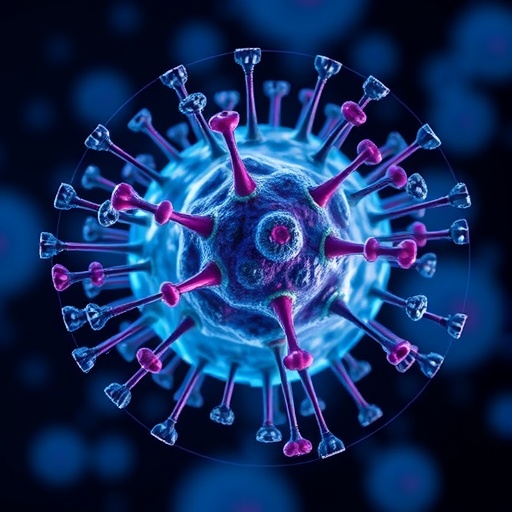Chimeric antigen receptor (CAR) T cell therapy has revolutionized the treatment landscape for certain hematologic malignancies, offering new hope to patients with lymphoma and various blood cancers. This advanced immunotherapy involves engineering a patient’s own T cells to recognize and eradicate cancer cells, turning the immune system’s natural defenders into precise tumor killers. However, despite its success in blood cancers, translating CAR T therapy to solid tumors remains a formidable challenge. Solid tumors such as those arising in the prostate, breast, lung, and ovary account for approximately 90 percent of all cancer cases, and their resilient tumor microenvironments have stymied effective immunotherapeutic engagement.
A remarkable breakthrough now emerges from a collaborative effort between the USC Norris Comprehensive Cancer Center and City of Hope, revealing a novel strategy that supercharges CAR T cells against solid tumors. By bioengineering CAR T cells to secrete a fusion protein combining interleukin 12 (IL-12) and a programmed death-ligand 1 (PD-L1) blocker, the researchers have created a potent and localized immune assault that overcomes the notoriously suppressive solid tumor milieu. IL-12 is a cytokine known for its ability to amplify immune activation, while PD-L1 blockade disrupts a key immune checkpoint used by tumors to evade immune attack. Linking these functions into a single fusion protein allows the therapy to selectively deliver an immune-priming payload directly at the tumor site.
The genius of this approach lies in its precision and safety profile. IL-12, though powerful, carries risks of systemic toxicity when administered broadly, often limiting its clinical utility. By tethering IL-12 to a PD-L1 inhibitor, which naturally accumulates in the tumor’s immunosuppressive microenvironment where PD-L1 levels are elevated, the researchers ensure the cytokine’s effects remain spatially confined. This localized delivery invigorates T cell activity just where it is needed, sparing healthy tissues from deleterious side effects. In mouse models of prostate and ovarian cancers, the engineered CAR T cells demonstrated significant tumor reduction without detectable toxicity elsewhere, showcasing both efficacy and safety.
The impact of fusing IL-12 and PD-L1 blockade extends beyond simply enhancing cytotoxic T cell activity. Solid tumors produce a hostile microenvironment that suppresses immune infiltration and promotes tumor growth. By releasing this dual-function fusion protein, CAR T cells effectively remodel this environment, reducing immunosuppressive factors, improving T cell penetration, and sustaining a robust antitumor response. This innovation addresses a fundamental barrier to solid tumor immunotherapy and exemplifies the strategic layering of immune-modulatory mechanisms within a single therapeutic agent.
This novel fusion protein design exemplifies rational immune engineering, capitalizing on the tumor’s own mechanisms to direct therapeutic action. PD-L1 expression is frequently upregulated by tumors both constitutively and in response to activated immune cells. The therapeutic strategy exploits this by using PD-L1 as a homing target, which ensures that the administration of IL-12 is not random but deliberately localized, anchoring the immune activation to the tumor microenvironment’s epicenter.
The team behind this research, led by Dr. Saul Priceman at the Keck School of Medicine of USC, rigorously evaluated this technology in preclinical models, providing a robust proof-of-concept. Their careful design addresses longstanding limitations of CAR T therapy in solid tumors and demonstrates a scalable path towards clinical translation. The engineered CAR T cells not only survived and proliferated in the tumor microenvironment but orchestrated a multifaceted immune attack that shrank tumors, something previous CAR T iterations struggled to achieve consistently.
Importantly, this technology appears adaptable and flexible across tumor types. The researchers are expanding testing to pancreatic and colorectal cancers and are preparing to explore brain tumors. Given the universality of immunosuppression within solid tumor microenvironments, the fusion protein approach holds promise as a broadly applicable platform, potentially transforming CAR T therapy into a viable strategy against many hard-to-treat cancers.
This scientific advancement also represents a conceptual shift, demonstrating the advantage of combining immune-stimulating cytokines with immune checkpoint inhibitors in one molecular entity. The fusion protein approach moves beyond sequential or combinational drug regimens, integrating multiple immunotherapeutic functions into a single biologic with concerted spatial and temporal effects, thereby enhancing synergy and minimizing systemic toxicity.
The safety findings are particularly encouraging. Toxicity has been a critical obstacle in the clinical development of IL-12-based therapies, limiting their applicability. The USC-City of Hope team’s strategy avoids off-target effects by localizing immune activation, a feature essential for advancing into human trials. The engineered CAR T cells exhibited negligible adverse impacts in distant organs, underscoring their clinical potential.
Looking ahead, the researchers envision rapid clinical translation, with plans to initiate human trials within one to two years. Furthermore, the fusion protein concept may extend beyond CAR T cells, potentially augmenting other cellular therapies such as tumor-infiltrating lymphocytes or T-cell receptor-engineered T cells. Such adaptability could broaden the clinical reach of this approach, empowering the immune system’s natural killers in multiple ways.
The scientific community eagerly anticipates the translation of these findings into human studies, as this strategy could redefine solid tumor immunotherapy. The collaboration’s published work in Nature Biomedical Engineering heralds a new chapter in immune cell engineering, where precise, multipronged attack strategies could finally unlock durable remissions for patients with previously refractory cancers.
As CAR T therapies move from blood cancers into the realm of solid tumors, innovations like this fusion protein engineering represent the vanguard of personalized and precision immunotherapies. Their success could dramatically expand and improve the lives of millions worldwide affected by solid tumors, marking a pivotal milestone in the ongoing war against cancer.
Subject of Research: Animals
Article Title: Solid tumour CAR-T cells engineered with fusion proteins targeting PD-L1 for localized IL-12 delivery
News Publication Date: 1-Sep-2025
Web References: DOI: 10.1038/s41551-025-01509-2
Keywords: Cancer immunotherapy, Chimeric antigen receptor therapy, T cell activation, T cell signaling, T lymphocytes, Prostate cancer, Ovarian cancer, Pancreatic cancer
Tags: bioengineering CAR T cellscytokines in immunotherapyimmune system activation in cancerinnovative cancer research collaborationsinterleukin 12 in cancer treatmentlymphomas and blood cancer therapiesnext-generation CAR T cell therapyovercoming tumor microenvironment challengesPD-L1 blockade in solid tumorspersonalized cancer treatment strategiessolid tumor immunotherapy breakthroughstargeted cancer therapies for solid tumors





